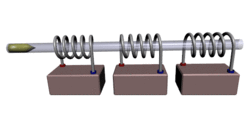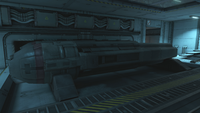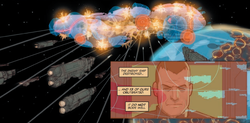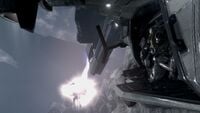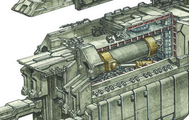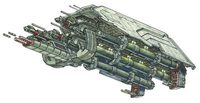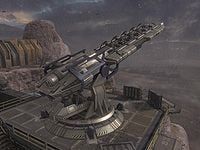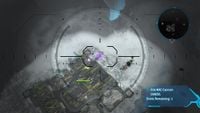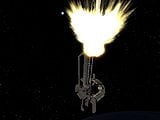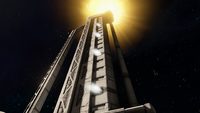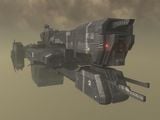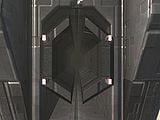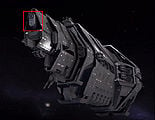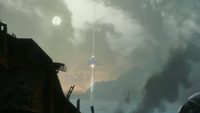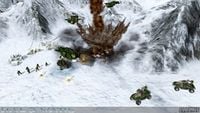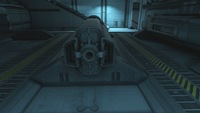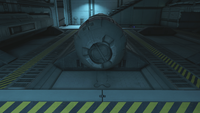Magnetic Accelerator Cannon: Difference between revisions
From Halopedia, the Halo wiki
m (→Aiming) |
(→Gallery: The anlace does not have a mac, instead it has a laser, so i removed it from the page, as it is not relevant to this topic.) Tag: Mobile edit |
||
| (79 intermediate revisions by 31 users not shown) | |||
| Line 1: | Line 1: | ||
{{ | {{Status|Canon}} | ||
[[File:HW MAC Strike.png| | [[File:HW MAC Strike.png|thumb|150px|A MAC round fired from space as part of [[orbital bombardment]].]] | ||
{{Quote|no=two | |||
|1=[[Nils Thune]] | |||
|2=[[Ponder]] | |||
|q1=Space? Those things even make noise in zero-gee? | |||
|q2=If you’re ''inside'' a MAC ship when the cannon fires? I don’t know if you’re a religious man, Governor. But it’s a little like a church bell— | |||
|3=Governor Thune and Captain Ponder discussing MACs.{{Ref/Reuse|CH7}} | |||
}} | |||
The '''magnetic accelerator cannon''',{{Ref/Reuse|WFG}} also referred to as a '''mass accelerator cannon'''{{Ref/Reuse|CH7}} or '''MAC''', is a type of heavy weapon system employed by [[human]]ity, primarily the spacecraft of the [[United Nations Space Command]]. Within the UNSC, MACs are defined as a heavy weapon that fires multi-ton projectiles at extraordinarily high velocities from the bow of a capital ship, [[orbital defense platform]] or mounted driver emplacement. They are hard-hitting, but relatively short-ranged.{{Ref/Book|Id=EVG114|EVG|Page=114}}{{Ref/Book|Id=Enc22P384&385|Enc22|Page=115}}{{Ref/Site|URL=https://www.halowaypoint.com/news/the-new-halo-encyclopedia-is-out-today|Site=Halo Waypoint|Page=The New Halo Encyclopedia is Out Today|D=11|M=03|Y=2023}} MACs are coilguns employing Asynchronous Linear Induction Motor (ALIM) technology{{Ref/Reuse|EVG114}} and are typically used in military applications, though similar technology can be used in civilian [[mass driver]]s for industrial use. | |||
==Overview== | ==Overview== | ||
MACs are fitted as a standard armament on most [[UNSC Navy]] vessels, ranging from small {{Class|Gladius|corvette}}s to {{Class|Marathon|heavy cruiser}}s and even [[UNSC carrier|carriers]] or refit civilian ships such as the {{Class|Phoenix|colony ship}}. With a handful of exceptions, MACs are typically spinally-mounted, meaning that the entire ship is built around the gun, with the cannon running a significant portion of the ship's length. However, the technology is not exclusively used in spinally-mounted MACs, with [[naval autocannon]]s (themselves sometimes referred to as "Mini-MACs"){{Ref/Book|Id=WFG|HWF|Section=Glossary|Page=90-92}} and even ground-based weapons such as the [[M68 Gauss cannon]] and [[M99 Stanchion]] operating on the same principle.{{Ref/Novel|Id=CH7|CH|Chapter=7}} | |||
=== | ===Operation=== | ||
[[File:Coilgun animation.gif|thumb|250px| | [[File:Coilgun animation.gif|thumb|250px|An animation of a coilgun's operating principle.]] | ||
MACs operate on the basis of a [[:Wikipedia:Coilgun|coilgun]]. When firing, a series of stacked coil motors are sequentially activated, propelling a projectile with vast amounts of kinetic energy.{{Ref/Reuse|WFG}} The construction of the weapon takes the form of a series of coiled conducting wires (or solenoids). When a solenoid is activated, the projectile is attracted to the coil. As the projectile reaches the coil, a second coil is activated, attracting the projectile further down the barrel of the gun. This process is repeated as the projectile travels the length of the gun, with each successive solenoid accelerating the projectile to higher and higher velocities. As such, the longer a MAC's length is, the faster the muzzle velocity of the fired projectile. | |||
This process differs from that of a [[Railgun (fiction)|railgun]] - a similar weapon system that feeds electrical current through a projectile to accelerate it along two conducting rails. Nonetheless, railgun weapon systems are occasionally referred to as MACs - as in the case of the Mini-MAC armament of the [[M510 Mammoth]].{{Ref/Reuse|H4IGMammoth}}{{Ref/Reuse|H4EVG115}} | |||
[[ | To fire a MAC, UNSC ships must draw power from the [[fusion reactor]] into a series of capacitors, storing the generated energy for firing. As such, charging the MAC draws power away from other sub-systems such as engines. As such, a MAC can be pre-charged and fired when ready, though at the cost of power to the aforementioned systems. Without the charge being maintained, the charge level does deteriorate. However, MACs can be fired at lower charge levels than 100%{{Ref/Novel|Id=FOR17|FOR|Chapter=17}} though likely to lesser maximum velocity. Likewise, firing the weapon at lower charge rates would also allow the weapon to fire more often if needed. | ||
===Ammunition=== | ===Ammunition=== | ||
[[ | MACs are capable of firing a wide array of munitions, depending on bore and model. Some MAC rounds are extremely dense and constructed of ferric tungsten,{{Ref/Reuse|EVG114}} noted by Captain [[Wallace]] of the frigate {{UNSCShip|Commonwealth}} as a "heavy round".{{Ref/Novel|Id=FOR12|FOR|Chapter=12}} In the case of the MACs fitted onto the refit-colony ship {{UNSCShip|Spirit of Fire}}, the rounds fired from its MACs are "low-mass"{{Ref/Book|Id=HWManual|Halo Wars Manual|Page=24}} or consist of three-hundred-ton depleted uranium slugs.{{Ref/Novel|Id=DW15|HDW|Chapter=16}} The MAC of the ''Spirit of Fire'' was later modified in a special project conducted by [[Ellen Anders]], resulting in a specialised MAC capable of firing rounds that emit an [[Electromagnetic pulse|EMP]] upon impact.{{Ref/Level|HW2|The Cartographer}} Other munitions that can be fired from MACs include semi-autonomous drone missiles{{Ref/Book|Id=WF32|HWF|Section=Destroyers|Page=32-33}} and for the larger 27 metre guns of {{UNSCShip|Infinity}}, even include cargo pods and small spacecraft.{{Ref/Book|Id=WF42|HWF|Section=[[UNSC Infinity|Infinity]]|Page=42-43}} A special kind of MAC round fired by the refit-{{UNSCShip|Pillar of Autumn}} was composed of a ferrous core and an outer layer of tungsten carbide, which allows the round to splinter on impact with an enemy vessel, similar to the [[shredder round]]s fired by an [[assault rifle]].{{Ref/Novel|Id=FOR29|FOR|Chapter=29}} | ||
Due to this variation, the masses, velocities and sizes of MAC projectiles can vary, ranging from 10 metre-long, 160 ton models fired by frigates and cruisers,{{Ref/Reuse|CH7}} to 600 ton{{Ref/Reuse|EVG114}} depleted uranium models fired by {{Class|Paris|heavy frigate}}s{{Ref/Novel|Id=FS29|FS|Chapter=29}} up to 3,000 ton{{Ref/Reuse|EVG114}} super-heavy rounds{{Ref/Novel|Id=FOR33|FOR|Page=364}} accelerated to "point four-tenths"{{Ref/Note|Id=Point|Due to massively conflicting interpretations of this number, this page only lists the wording used in the original text of ''The Fall of Reach''.}} of the speed of light by the [[orbital defense platform]]s above [[Reach]].{{Ref/Novel|Id=FOR31|FOR|Chapter=31}} The MACs of {{UNSCShip|Infinity}} are additionally capable of firing various "sub-caliber" munitions (For example, three-thousand-ton slugs) for its massive twenty-seven metre bore, alongside some of the special types mentioned prior.{{Ref/Book|Id=HM132|HM|Section=Earth's Fleet|Page=132-133}} A type of 1,200 feet (366 meters) long MACs have a range of 10,000 miles (16,093 kilometers).{{Ref/Book|Id=EncP316|Enc09|Page=316}} | |||
<gallery> | |||
File:H2A Screenshot Cairo MAC Slug.png|A slug fired by Cairo Station's massive "Super-MAC" gun. | |||
File:HW 14D4A1 MAC internals.png|A cross-section of the MAC found on Cairo Station. | |||
</gallery> | |||
===Usage=== | |||
[[File:HWG SecondBattleOfHarvest.png|thumb|250px|[[Battle Group X-Ray]] firing their MACs at a {{Pattern|Rasus|interdictor}}.]] | |||
{{Quote|MAC rounds? In atmosphere?|[[Jorge-052]] exclaiming his alarm at the intent to fire the MAC of {{UNSCShip|Grafton}} during the [[Fall of Reach]].}} | |||
{{Expand-section}} | |||
As some of the largest and most destructive weapons available to humanity, their use is primarily constricted to [[space warfare]]. Most UNSC spacecraft are equipped with some form of spinal MAC, requiring the vessel to manually turn and face the target it wishes to fire on. MAC rounds are often fired in concentrated volleys by fleets of coordinated warships, and used as a long-ranged weapon for "sniping" enemy ships out of the sky. During the [[Human-Covenant War|war]] against the Covenant, human MAC volleys were often fired in concentration, aiming to overload a target ship's [[energy shielding]]. | |||
=== | ====Atmospheric use and orbital bombardment==== | ||
In select circumstances, MACs can be employed in atmospheres or for the purposes of [[orbital bombardment]]. Such orbital bombardment can be deployed against large targets such as enemy warships or [[Covenant citadel|bases]], or against targets as (relatively) small as a [[Protos-pattern Scarab|Scarab]].{{Ref/Site|D=01|M=6|Y=2020|URL=https://www.halowaypoint.com/en-us/universe/locations/new-mombasa|Site=Halo Waypoint|Page=New Mombasa}} During the [[Battle for Arcadia]], the {{UNSCShip|Spirit of Fire}} made liberal use of up to forty MAC strikes in rapid succession to destroy a Covenant staging area near the [[Arcadia ONI facility]].{{Ref/Level|HW|Dome of Light}}{{Ref/Note|In-game, this section of the level involves using up to forty MAC blasts to orbital strike the Covenant base; it is possible that this strike is merely an example of gameplay not aligning with canon or an example of the ''Spirit'' employing its ancilliary naval coilgun batteries.}} | |||
<gallery> | <gallery> | ||
File: | File:Spire MAC'd.jpg|{{UNSCShip|Grafton}} fires its MAC at [[Spire One]]. | ||
File: | File:Mac.jpg|The frigates of [[Battle Group Victory]] fire their MACs at ''[[Anodyne Spirit]]'' - to negligible effect. | ||
</gallery> | </gallery> | ||
*''' | ==MAC classifications== | ||
MACs operate under a complex designation scheme composed of three primary naming components; | |||
*'''MAC model number''' - the serial number designation for the specific MAC in question, composed of six alphanumeric characters consisting of two digits followed by a letter, a digit, another letter, and a final digit. The model number refers to the entire MAC assembly; in smaller vessels this applies to just the singular gun, in larger vessels it may be used to refer to the entire MAC battery. When used to refer to a MAC battery as a whole, the individual guns appear not to have any individual designations. The precise method for naming MAC models is unclear and does not have any outwardly-obvious sequential numbering or correspondence to the target ship(s) in question. | |||
**Example: ''45J3D3'' | |||
*'''Mark designation''' - Marks seem to be overall MAC generations, though the relationship of these weapons does not fully-line up with the years of introduction for the individual ships. | |||
**Example: ''Mark IX'' | |||
*'''Size''' - this category denotes the overall size of the MAC, with the classifications of Light, Heavy, and Superheavy in use.{{Ref/Reuse|SuperMac}} The term "mini-MAC" is also sometimes informally used to designate [[naval autocannon]]s or [[Railgun (fiction)#Heavy railguns|heavy railguns]]. | |||
MACs are primarily divided into two distinct classifications; light MACs and heavy MACs (also referred to as Light Coil and Heavy Coil). Overall MAC generations are denoted as Marks, with specific models given a unique identifying code. Heavy MACs appear to be typically fitted on mainline fighting vessels such as those of the {{Class|Autumn|cruiser}} and {{Class|Strident|heavy frigate}}, while light MACs are predominantly fitted on lighter warships such as the ''Charon'' and ''Stalwart'' frigate classes, ships not intended as line warships such as the ''Epoch'' class carrier or ships historically considered under-gunned as capital ships, such as the {{Class|Halcyon|cruiser}}. | |||
=== | Some of the largest MAC types, such as those found on select orbital defense platforms and large warships, are referred to as "Super MACs".{{Ref/Reuse|FOR31}}{{Ref/Site|Id=SuperMac|URL=http://community.spartangames.co.uk/index.php?/topic/16805-halo-waypoint-update-with-spartan-new-ships/page-7|Site=Spartan Games Forums|Page=Halo Waypoint Update with Spartan - NEW SHIPS!|Detail=(defunct)|Quote='Super MAC' is more a category than a specific weapon. Many defense platforms do not have 'super MACs' as used by Reach installations, for example.}} | ||
===Mark IX=== | {| class="wikitable"|- | ||
! Model !! Mark !! Size !! Usage !! Notes | |||
|- | |||
| 14B11R2 battery{{Ref/Book|Id=Mythos82|HM|Section=Under Siege|Page=82-83}} || || Light Coil{{Ref/Tabletop|HFB|Detail=Halberd-class destroyer in-game unit}} || {{Class|Halberd|light destroyer}} || 1x 1411BR2 battery;{{Ref/Book|Id=Enc22Destroyers|Enc22|Page=124-225}} twin-linked 1170mm/647mm (46"/25.5") high-velocity coilguns.{{Ref/Reuse|Mythos82}} The larger gun is used for firing all standard munition packages, while the smaller is only used for firing kinetic rounds.{{Ref/Reuse|WF32}} | |||
|- | |||
|14D4A1 || Mark V || Superheavy coil || {{Class|Moncton|orbital weapon platform}}{{Ref/Book|Id=WF30|HWF|Section=Cairo Station|Page=30-31}} || Can accelerate multi-ton rounds to "several kilometres per second".{{Ref/Reuse|WF30}} | |||
|- | |||
| || Mark V || Superheavy coil{{Ref/Tabletop|HFB|Detail=UNSC MAC Platform in-game unit}} || {{Class|Erőd|orbital weapon platform}} || Capable of accelerating a 3,000 ton projectile to "point four-tenths"{{Ref/NoteReuse|Point}} of lightspeed.{{Ref/Reuse|FOR31}} | |||
|- | |||
| 22B6R3 battery{{Ref/Book|Id=Mythos70|HM|Section=Shield World|Page=70-71}} || || || {{Class|Phoenix|support ship}} {{C|refit}} || 3x individual 530cm 22B6R3 MACs{{Ref/Book|Id=WF48|HWF|Section=Spirit of Fire|Page=48-49}}{{Ref/Reuse|Mythos70}} | |||
|- | |||
| 20DA1C2 || || || {{Class|Gladius|heavy corvette}}{{Ref/Book|Id=Enc22Corvettes|Enc22|Page=128-129}} || | |||
|- | |||
| 20F9B9 || || || {{Class|Point Blank|prowler}}{{Ref/Reuse|Enc22Corvettes}} || | |||
|- | |||
| 45J3D3 || Mark IX || Heavy coil || {{Class|Autumn|heavy cruiser}}{{Ref/Book|Id=WF26|HWF|Section=Cruisers|Page=26-27}}{{Ref/Book|Id=Enc22Cruisers|Enc22|Page=119-120}} || | |||
|- | |||
| 49F9A1 || || Heavy coil{{Ref/Tabletop|HFB|Detail=Marathon-class cruiser in-game unit}} || {{Class|Marathon|heavy cruiser}}{{Ref/Reuse|Enc22Cruisers}} || | |||
|- | |||
| 50GE1A || || Heavy coil{{Ref/Tabletop|HFB|Detail=Valiant-class cruiser in-game unit}} || {{Class|Valiant|super-heavy cruiser}}{{Ref/Reuse|Enc22Cruisers}} || | |||
|- | |||
| 56A2D4 || Mark II || Light coil || {{Class|Halcyon|light cruiser}}{{Ref/Reuse|Enc22Cruisers}}<br>{{Class|Stalwart|light frigate}}{{Ref/Site|Id=WaypointIAC|D=01|M=6|Y=2020|URL=https://www.halowaypoint.com/en-us/universe/vehicles/unsc-in-amber-clad|Site=Halo Waypoint|Page=In Amber Clad}}{{Ref/Book|Id=WF36|HWF|Section=In Amber Clad|Page=37-37}}{{Ref/Note|In the ''[[Halo Encyclopedia (2022 edition)]]'', this weapon is erroneously referred to as a 21X5V9 MAC. It is unclear whether this is an intentional retcon or indicative that UNSC ''In Amber Clad'' had a specialised weapon refit. As such, this page treats the ''Warfleet'' stat as definitive.}} || In the case of the refit ''Halcyon''-class cruiser ''{{UNSCShip|Pillar of Autumn}}'', the 56A2D4 runs two-thirds the length of the ship{{Ref/Book|Id=WF24|HWF|Section=Pillar of Autumn|Page=24-25}} and employed special magnetic field recyclers along its length that, when combined with booster capacitors, allowed the gun to fire three times in rapid succession.{{Ref/Reuse|FOR29}}{{Ref/Reuse|Enc22Cruisers}} | |||
|- | |||
| 56A2F9 || Mark II || Light coil || {{Class|Epoch|heavy carrier}} || Rapid-fire variant of the 56A2D4 model. On an ''Epoch'', this weapon is intended as a defensive weapon though it was sometimes employed to add to coordinated volleys of fire.{{Ref/Book|Id=WF40|HWF|Section=Carriers|Page=40-41}}{{Ref/Book|Id=Enc22Carriers|Enc22|Page=126-127}} | |||
|- | |||
| 5D7C2 || || || {{Class|Lancer|fast-attack corvette}} || 1x 5D7C2{{Ref/Site|Id=CFFoundations|URL=https://www.halowaypoint.com/news/canon-fodder-foundations|Site=Halo Waypoint|Page=Canon Fodder - Foundations|D=12|M=01|Y=2022}} | |||
|- | |||
| 5D8F6 || || || {{Class|Able|heavy destroyer}} || The 5D8F6 was not standard on the original 2490 version and only became standard with the 2525 refit. Despite this, at least one Able, the {{UNSCShip|Gorgon}} was refit with a MAC sometime in the 2490's{{Ref/Site|Id=CFDigsite|URL=https://www.halowaypoint.com/news/canon-fodder-digsite-dissection|Site=Halo Waypoint|Page=Canon Fodder - Digsite Dissection|D=28|M=07|Y=2023}} | |||
|- | |||
| 65P8V1 || || Light coil{{Ref/Tabletop|HFB|Detail=Paris-class frigate in-game unit}} || {{Class|Paris|heavy frigate}} || 1x 65P8V1 MAC{{Ref/Book|Id=Enc22Frigates|Enc22|Page=120-123}} | |||
|- | |||
| 76G3V5 battery || Mark X || Superheavy coil || {{Class|Vindication|light battleship}} || 1x 76G3V5 MAC battery; twin Mark X superheavy MACs{{Ref/Reuse|Enc22Destroyers}} | |||
|- | |||
| 83B6R1 || || || {{Class|Hillsborough|heavy destroyer}}{{Ref/Reuse|Enc22Destroyers}} || | |||
|- | |||
| 83B6R3 || Mark II || Light coil || {{Class|Charon|light frigate}} || 1x 83B6R3 MAC{{Ref/Site|Id=Bulletin101012|URL=http://blogs.halowaypoint.com/Headlines/post/2012/10/10/The-Halo-Bulletin-101012-.aspx|Site=Halo Waypoint|Page=The Halo Bulletin: 10.10.12|D=02|M=03|Y=2013}}{{Ref/Book|Id=H4EVG191|H4EVG|Page=191-192}}{{Ref/Reuse|Enc22Frigates}} | |||
|- | |||
| 90C1E1 || || Heavy coil || {{Class|Orion|assault carrier}} || 2x 90C1E1 MACs{{Ref/Reuse|Enc22Carriers}} | |||
|- | |||
| 94B1E6 || Mark IV || Heavy coil || {{Class|Strident|heavy frigate}}{{Ref/Site|Id=WaypointFrigate|D=01|M=6|Y=2020|URL=https://www.halowaypoint.com/en-us/universe/vehicles/unsc-frigate|Site=Halo Waypoint|Page=UNSC Frigate}} || Limited munitions supply, twelve capacitor banks for power.{{Ref/Book|Id=WF38|HWF|Section=Frigates|Page=38-39}}{{Ref/Reuse|Enc22Frigates}} | |||
|- | |||
| CR-01D || Series 6 || Superheavy coil{{Ref/Tabletop|HFB|Detail=Punic-class supercarrier in-game unit}} || {{Class|Punic|supercarrier}} || 2x CR-01D Series 6 MAC{{Ref/Reuse|Enc22Carriers}} | |||
|- | |||
| CR-03 || Series 8 || || {{Class|Infinity|supercarrier}} || Initial model also known as the '''CR03S8 MAC'''. Fielded on {{UNSCShip|Infinity}}, these guns have a twenty-seven metre bore.{{Ref/Reuse|HM132}} | |||
|- | |||
| CR-03B || Series 8 || Superheavy || {{Class|Infinity|supercarrier}}{{Ref/Reuse|Enc22Carriers}} || Refit package model integrated late in [[2558]], though originally intended for the ''Eternity''.{{Ref/Reuse|WF42}} | |||
|} | |||
<gallery> | <gallery> | ||
File:HW CR-03B MAC.png| | File:HW - MII Light coil 56A2D4 MAC.png|The 56A2D4 in the ''Pillar of Autumn''. | ||
File:HW - MII Light coil 56A2D4 MAC2.png|The 56A2D4 in the ''In Amber Clad''. | |||
File:HW 14D4A1 MAC internals.png|Internal workings of the 14D4A1 MAC on ''[[Cairo Station (station)|Cairo Station]]''. | |||
File:HW CR-03B MAC.png|The forward CR-03B MAC's on the Infinity. | |||
</gallery> | </gallery> | ||
=== | ===MAC batteries=== | ||
"MAC batteries" refer to weapon systems in which multiple MACs are linked together as part of one weapon system. Such batteries may use differing bores and barrel lengths for different usage scenarios, or may consist of multiple identical guns. | |||
==Usage== | |||
<!--This section should only describe the general usage of MAC weapons as shown in the fiction. In-depth calculations DO NOT belong on this page, and will be removed. --> | |||
===Corvette MACs=== | |||
Even on the smallest end of UNSC spacecraft designs, the MAC is a staple feature - forming the bulk of the spinal mount on the {{Convert|243|m|ft}}-long {{Class|Gladius|corvette}}. The ''Gladius'' mounts a single 20DA1C2 MAC, and is currently the smallest known vessel to mount a full-scale ship MAC.{{Ref/Book|HWF|Section=Defenses|Page=19}} The {{Class|Lancer|fast-attack corvette}} employs a single 5D7C2 MAC.{{Ref/Site|Id=CFFoundations|URL=https://www.halowaypoint.com/news/canon-fodder-foundations|Site=Halo Waypoint|Page=Canon Fodder - Foundations|D=12|M=01|Y=2022}} | |||
== | ===Frigate MACs=== | ||
[[UNSC frigate]]s typically run the length of the entire ship, averaging a length of {{Convert|183|m|ft}}.{{Ref/Reuse|EVG114}} Frigates in the [[Human-Covenant War]] typically employed light MACs. The ''Stalwart'' and ''Charon''-classes equipped a 56A2D4 Light Coil MAC and an 83B6R3 Light Coil MAC, respectively, with the post-war ''Strident'' heavy frigate equipped with a Mark IV 94B1E6 heavy coil MAC.{{Ref/Reuse|WF38}} Despite being a heavy frigate, the ''Paris''-class employed a light MAC.{{Ref/Reuse|HFB93}} | |||
[[ | |||
On the ''Paris'' and ''Charon''-classes of ship, the barrel of the gun itself is located in the upper boom at the fore of the ship, with the lower boom containing fire-control systems and pulsed power storage. This is inverted on the ''Stalwart'' class, where the barrel is in the lower boom.{{Ref/Reuse|WF36}} The heavy MAC employed by the ''Strident'' frigate employs twelve capacitor cells, allowing it to achieve firepower levels similar to those of destroyers or light cruisers - limited only by the stock of ammunition carried aboard ship.{{Ref/Reuse|WF38}} | |||
===Destroyer MACs=== | |||
The [[Unidentified UNSC heavy destroyer class|heavy destroyer]] {{UNSCShip|Gorgon}} was the first ship of its class to mount a MAC, sporting one gun and carrying only three slugs.{{Ref/Anthology|Id=Cole|HEvo|Story=The Impossible Life and the Possible Death of Preston J. Cole}} The later ''Halberd''-class was fitted with a 14B11R2 MAC battery consisting of dual twin-linked 1170mm/647mm MACs, with the smaller gun only used for launching kinetic kill rounds and the larger gun compatible with all standard mission packages.{{Ref/Reuse|WF32}}{{Ref/Reuse|Mythos82}} The ''Halberd'' is able to fire its MACs on lower-than 100% charge levels for more rapid-firing,{{Ref/Reuse|FOR17}} and can be equipped with MAC capacitor cells to easily recharge; these cells are easily replacable when damaged.{{Ref/Reuse|WF32}} | |||
Destroyers like the ''Halberd'' are typically organised into wolf-packs, aiming to coordinate MAC volleys on enemy ships and overwhelm their defenses.{{Ref/Reuse|WF32}} | |||
'' | ===Cruiser MACs=== | ||
Unlike their smaller counterparts, [[cruiser]]s typically employ Heavy MACs as a standard armament - befitting of their status as the primary line warship of the UNSC Navy. The {{Class|Marathon|heavy cruiser}} sports two heavy MACs{{Ref/Book|EVG|Page=42}}{{Ref/Book|Id=HFB93|Halo: Fleet Battles core rulebook|Page=93}} Late-war ''Marathons'' were in such high demand that even half-completed hulls were pressed into service for the use of their heavy MAC systems, often paired together with another ''Marathon'' as part of the [[UNSC Navy tactical formations|"Gorgon"]] formation. These cruisers would pinpoint larger Covenant warships with sustained fire, giving smaller craft a chance to deal damage of their own.{{Ref/Book|Id=HFB125|Halo: Fleet Battles core rulebook|Page=125}}The ''Autumn''-class heavy cruiser was fitted with a Mark IX heavy coil 45J3D3 MAC, and the {{Class|Valiant|super-heavy cruiser}} a heavy MAC of its own.{{Ref/Game|Halo: Fleet Battles|Valiant-class cruiser expansion}} | |||
'' | Contrary to the aforementioned examples, the ''Halcyon''-class light cruiser does not employ a heavy MAC, but rather a light one - likely the cause of the ship being infamous for being undergunned within the UNSC fleet. When refit for [[Operation: RED FLAG]], the ''Pillar of Autumn'' was fitted with a specialised modification to a Mark II light coil 56A2D4 MAC - the same as that found on the ''Stalwart''-class light frigate.{{Ref/Reuse|WF24}} This gun ran two-thirds the length of the ''Autumn''{{'}}s length,{{Ref/Reuse|WF24}} and employed special magnetic field recyclers that - when combined with booster capacitors - allowed the gun to fire three times in rapid succession.{{Ref/Reuse|FOR29}} | ||
'' | ===Carrier MACs=== | ||
[[UNSC carrier]]s employ a range of MAC types. On the smaller end, the ''Epoch''-class employs the Mark II 52A6F9 light coil MAC, a rapid-fire upgrade of that seen on the ''Stalwart''-class Frigate and intended for defensive purposes. In larger fleets, the ''Epoch'' may lend this MAC's fire to coordinated volleys. The {{Class|Orion|assault carrier}} employs a larger heavy MAC,{{Ref/Game|Halo: Fleet Battles|Orion-class cruiser expansion}} while the extremely large {{Class|Punic|supercarrier}} employs two "Super-MACs", running the length of its enormous spaceframe. In addition to this, the ''Punic'' sports a number of smaller "Mini-MAC" turrets allowing it to fire on all angles.{{Ref/Site|Id=SpartanPunic|URL=http://www.spartangames.co.uk/meet-the-big-hitters|Site=Spartan Games|Page=Meet The Big Hitters|D=01|M=6|Y=2016}} | |||
=== | ===Orbital defense platform MACs=== | ||
Given their stationary nature, [[orbital defense platform]]s are able to employ much larger MACs than those employed on most warships, often dubbed "Super" MACs. The {{Class|Moncton|orbital weapon platform}} employed over [[Earth]] employed a single Mark V 14D4A1 MAC, purportedly capable of "putting a round clean through a Covenant capital ship".{{Ref/Level|H2|Cairo Station}} The 14D4A1 MAC employed on stations like [[Cairo Station (station)|Cairo Station]] employs hundreds of ALIM motors to line the barrel, capable of accelerating a projectile at multiple kilometres per-second. These stations employ stacked liquid-metal capacitor cells, allowing the gun to rapidly-cycle as long as their charge lasts.{{Ref/Reuse|WF30}} | |||
The fortress-world [[Reach]] sported its own orbital defense guns, equipped with some of the most powerful MACs ever built. These rapid-firing MACs were connected to [[Orbital defense generator|ground-based generators]] which allowed them to rapidly recharge and fire.{{Ref/Site|URL=https://www.halowaypoint.com/en-us/news/canon-fodder-looking-glassed|Site=Halo Waypoint|Page=Canon Fodder - Looking Glassed|D=11|M=3|Y=2021}} | |||
==="Mini"-MACs=== | |||
The so-called "Mini"-MAC is a nickname given to the primary weapon system employed by the ground-based [[M510 Mammoth]] siegework platform. The Mammoth sports a Mark 2457/35 cm HRG, a large [[Railgun (fiction)|railgun]] intended to target and eliminate hostile vessels, vehicles, and fortifications in terrestrial or suborbital positions.{{Ref/Book|Id=H4EVG115|H4EVG|Page=115}}{{Ref/Generic|Id=H4IGMammoth|[[Halo 4 Interactive Guide]]|Mammoth}} These weapons can be linked to a target locator, and are powerful enough to take out even [[Forerunner]] [[Z-8060 particle cannon]]s.{{Ref/Level|Id=H4Reclaimer|H4|Reclaimer (level)|Reclaimer}} | |||
A number of Mini MAC turrets serve as secondary armaments on the ''Punic''-class supercarrier.{{Ref/Reuse|SpartanPunic}} | |||
A | |||
===" | ==="Onagers"=== | ||
[[File:Onager.jpg|thumb|200px | [[File:Onager.jpg|thumb|200px|An Onager MAC on [[Reach]] in the [[Asźod ship breaking yards]].]] | ||
{{Main|Mark 2488 Magnetic Accelerator Cannon|Mark 2551 Magnetic Accelerator Cannon}} | {{Main|Mark 2488 Magnetic Accelerator Cannon|Mark 2551 Magnetic Accelerator Cannon}} | ||
The Mark 2488 Magnetic Accelerator Cannon, informally known as the Onager, is a relatively small Magnetic Accelerator Cannon used for static defense. A manned version was used to defend the ''Pillar of Autumn'' on Reach. | The Mark 2488 Magnetic Accelerator Cannon, informally known as the Onager, is a relatively small Magnetic Accelerator Cannon used for static defense. A manned version was used to defend the ''Pillar of Autumn'' on Reach.{{Ref/Level|HR|The Pillar of Autumn (Halo: Reach level)|The Pillar of Autumn}} The Mark 2488 fires a 15 cm round with up to 1.1 gigajoules (0.25 tons) of kinetic energy. It is 32.6 meters long,{{Ref/Book|H4EVG|Page=75}} | ||
==Related technologies== | ==Related technologies== | ||
| Line 127: | Line 173: | ||
==Gameplay== | ==Gameplay== | ||
[[File:HW MACBlast HUD.jpg|thumb | [[File:HW MACBlast HUD.jpg|thumb|The MAC Blast in use.]] | ||
===''Halo Wars''=== | ===''Halo Wars''=== | ||
{{Quote|Use the Spirit of Fire's awesome Mass Accelerator Cannon to incinerate enemy troops.|In-game description.}} | {{Quote|Use the Spirit of Fire's awesome Mass Accelerator Cannon to incinerate enemy troops.|In-game description.}} | ||
In ''[[Halo Wars]]'', the '''MAC Blast''' ability allows the player to use the {{UNSCShip|Spirit of Fire}}'s [[11A2R1 naval coilgun battery|point-defense MACs]] for pinpoint [[orbital bombardment]]. It is mainly used as a support weapon to help the UNSC penetrate heavy Covenant defenses and Covenant bases, and is a potent weapon against [[ | In ''[[Halo Wars]]'', the '''MAC Blast''' ability allows the player to use the {{UNSCShip|Spirit of Fire}}'s [[11A2R1 naval coilgun battery|point-defense MACs]] for pinpoint [[orbital bombardment]]. It is mainly used as a support weapon to help the UNSC penetrate heavy Covenant defenses and Covenant bases, and is a potent weapon against [[Deutoros-pattern Scarab|Scarabs]]. | ||
In [[Skirmish]] and multiplayer, the MAC Blast can only be used if [[Captain (Navy)|Captain]] [[James Cutter]] is selected as the player's leader character. In the campaign, the MAC Blast is available in several missions, most notably ''[[Dome of Light]]'', during which the player is granted access to forty rapid-fire MAC rounds to destroy a Covenant base that was located under a Covenant energy shield dome until part of the dome was overloaded using [[M145D Rhino|Rhinos]]. | In [[Skirmish]] and multiplayer, the MAC Blast can only be used if [[Captain (Navy)|Captain]] [[James Cutter]] is selected as the player's leader character. In the campaign, the MAC Blast is available in several missions, most notably ''[[Dome of Light]]'', during which the player is granted access to forty rapid-fire MAC rounds to destroy a Covenant base that was located under a Covenant energy shield dome until part of the dome was overloaded using [[M145D Rhino|Rhinos]]. | ||
| Line 154: | Line 200: | ||
File:Spire MAC'd.jpg|The {{UNSCShip|Grafton}} firing its MAC at ''[[Spire One]]''. | File:Spire MAC'd.jpg|The {{UNSCShip|Grafton}} firing its MAC at ''[[Spire One]]''. | ||
File:PoAMAC.jpg|The muzzle of the {{UNSCShip|Pillar of Autumn}}'s MAC. | File:PoAMAC.jpg|The muzzle of the {{UNSCShip|Pillar of Autumn}}'s MAC. | ||
File:H4-Infinity-Firing.jpg|The {{UNSCShip|Infinity}} fires her forward | File:H4-Infinity-Firing.jpg|The {{UNSCShip|Infinity}} fires her forward MACs at the ''[[Mantle's Approach]]''. | ||
File:Corvette destroyed.png|The effect of a MAC round fired from an orbital defense platform on an {{ | File:Corvette destroyed.png|The effect of a MAC round fired from an orbital defense platform on an {{Pattern|Ceudar|heavy corvette}}. | ||
File: | File:HW Screenshots E3 11.jpg|A MAC round impacting the surface of [[Harvest]]. | ||
File:TFoR AS - Commonwealth MAC.jpg|{{UNSCShip|Commonwealth}} firing her MAC. | File:TFoR AS - Commonwealth MAC.jpg|{{UNSCShip|Commonwealth}} firing her MAC. | ||
File:H2A Screenshot Cairo MAC Slug Rear.png|thumb|The rear of a slug for ''[[Cairo Station (station)|Cairo Station]]''{{'}}s Magnetic Accelerator cannon, seen in ''[[Halo 2: Anniversary]]''. | |||
File:H2A Screenshot Cairo MAC Slug Rear.png|thumb|The rear of a slug for ''[[Cairo Station (station)|Cairo Station]]'''s Magnetic Accelerator cannon, seen in ''[[Halo 2: Anniversary]]''. | File:H2A Screenshot Cairo MAC Slug Tip.png|thumb|The tip of a slug for ''[[Cairo Station (station)|Cairo Station]]''{{'}}s Magnetic Accelerator cannon. | ||
File:H2A Screenshot Cairo MAC Slug Tip.png|thumb|The tip of a slug for ''[[Cairo Station (station)|Cairo Station]]'''s Magnetic Accelerator cannon. | |||
</gallery> | </gallery> | ||
| Line 194: | Line 239: | ||
*''[[Halo Wars 2]]'' | *''[[Halo Wars 2]]'' | ||
*''[[Halo: Envoy]]'' {{Mo}} | *''[[Halo: Envoy]]'' {{Mo}} | ||
*''[[Halo: Silent Storm]]'' | |||
*''[[Halo: Oblivion]]'' | *''[[Halo: Oblivion]]'' | ||
*''[[Halo: Shadows of Reach]]'' | |||
*''[[Halo: Divine Wind]]'' | |||
*''[[Halo: The Rubicon Protocol]]'' {{Mo}} | |||
==Notes== | ==Notes== | ||
{{Ref/Notes}} | |||
==Sources== | ==Sources== | ||
{{Ref/Sources}} | |||
{{UNSC heavy weapons}} | {{UNSC heavy weapons}} | ||
Latest revision as of 12:26, November 14, 2024
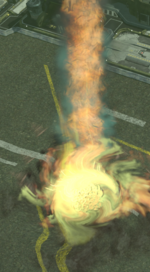
- Nils Thune: "Space? Those things even make noise in zero-gee?"
- Ponder: "If you’re inside a MAC ship when the cannon fires? I don’t know if you’re a religious man, Governor. But it’s a little like a church bell—"
- — Governor Thune and Captain Ponder discussing MACs.[1]
The magnetic accelerator cannon,[2] also referred to as a mass accelerator cannon[1] or MAC, is a type of heavy weapon system employed by humanity, primarily the spacecraft of the United Nations Space Command. Within the UNSC, MACs are defined as a heavy weapon that fires multi-ton projectiles at extraordinarily high velocities from the bow of a capital ship, orbital defense platform or mounted driver emplacement. They are hard-hitting, but relatively short-ranged.[3][4][5] MACs are coilguns employing Asynchronous Linear Induction Motor (ALIM) technology[3] and are typically used in military applications, though similar technology can be used in civilian mass drivers for industrial use.
Overview[edit]
MACs are fitted as a standard armament on most UNSC Navy vessels, ranging from small Gladius-class corvettes to Marathon-class heavy cruisers and even carriers or refit civilian ships such as the Phoenix-class colony ship. With a handful of exceptions, MACs are typically spinally-mounted, meaning that the entire ship is built around the gun, with the cannon running a significant portion of the ship's length. However, the technology is not exclusively used in spinally-mounted MACs, with naval autocannons (themselves sometimes referred to as "Mini-MACs")[2] and even ground-based weapons such as the M68 Gauss cannon and M99 Stanchion operating on the same principle.[1]
Operation[edit]
MACs operate on the basis of a coilgun. When firing, a series of stacked coil motors are sequentially activated, propelling a projectile with vast amounts of kinetic energy.[2] The construction of the weapon takes the form of a series of coiled conducting wires (or solenoids). When a solenoid is activated, the projectile is attracted to the coil. As the projectile reaches the coil, a second coil is activated, attracting the projectile further down the barrel of the gun. This process is repeated as the projectile travels the length of the gun, with each successive solenoid accelerating the projectile to higher and higher velocities. As such, the longer a MAC's length is, the faster the muzzle velocity of the fired projectile.
This process differs from that of a railgun - a similar weapon system that feeds electrical current through a projectile to accelerate it along two conducting rails. Nonetheless, railgun weapon systems are occasionally referred to as MACs - as in the case of the Mini-MAC armament of the M510 Mammoth.[6][7]
To fire a MAC, UNSC ships must draw power from the fusion reactor into a series of capacitors, storing the generated energy for firing. As such, charging the MAC draws power away from other sub-systems such as engines. As such, a MAC can be pre-charged and fired when ready, though at the cost of power to the aforementioned systems. Without the charge being maintained, the charge level does deteriorate. However, MACs can be fired at lower charge levels than 100%[8] though likely to lesser maximum velocity. Likewise, firing the weapon at lower charge rates would also allow the weapon to fire more often if needed.
Ammunition[edit]
MACs are capable of firing a wide array of munitions, depending on bore and model. Some MAC rounds are extremely dense and constructed of ferric tungsten,[3] noted by Captain Wallace of the frigate UNSC Commonwealth as a "heavy round".[9] In the case of the MACs fitted onto the refit-colony ship UNSC Spirit of Fire, the rounds fired from its MACs are "low-mass"[10] or consist of three-hundred-ton depleted uranium slugs.[11] The MAC of the Spirit of Fire was later modified in a special project conducted by Ellen Anders, resulting in a specialised MAC capable of firing rounds that emit an EMP upon impact.[12] Other munitions that can be fired from MACs include semi-autonomous drone missiles[13] and for the larger 27 metre guns of UNSC Infinity, even include cargo pods and small spacecraft.[14] A special kind of MAC round fired by the refit-UNSC Pillar of Autumn was composed of a ferrous core and an outer layer of tungsten carbide, which allows the round to splinter on impact with an enemy vessel, similar to the shredder rounds fired by an assault rifle.[15]
Due to this variation, the masses, velocities and sizes of MAC projectiles can vary, ranging from 10 metre-long, 160 ton models fired by frigates and cruisers,[1] to 600 ton[3] depleted uranium models fired by Paris-class heavy frigates[16] up to 3,000 ton[3] super-heavy rounds[17] accelerated to "point four-tenths"[Note 1] of the speed of light by the orbital defense platforms above Reach.[18] The MACs of UNSC Infinity are additionally capable of firing various "sub-caliber" munitions (For example, three-thousand-ton slugs) for its massive twenty-seven metre bore, alongside some of the special types mentioned prior.[19] A type of 1,200 feet (366 meters) long MACs have a range of 10,000 miles (16,093 kilometers).[20]
Usage[edit]
- "MAC rounds? In atmosphere?"
- — Jorge-052 exclaiming his alarm at the intent to fire the MAC of UNSC Grafton during the Fall of Reach.
 This section needs expansion. You can help Halopedia by expanding it.
This section needs expansion. You can help Halopedia by expanding it.
As some of the largest and most destructive weapons available to humanity, their use is primarily constricted to space warfare. Most UNSC spacecraft are equipped with some form of spinal MAC, requiring the vessel to manually turn and face the target it wishes to fire on. MAC rounds are often fired in concentrated volleys by fleets of coordinated warships, and used as a long-ranged weapon for "sniping" enemy ships out of the sky. During the war against the Covenant, human MAC volleys were often fired in concentration, aiming to overload a target ship's energy shielding.
Atmospheric use and orbital bombardment[edit]
In select circumstances, MACs can be employed in atmospheres or for the purposes of orbital bombardment. Such orbital bombardment can be deployed against large targets such as enemy warships or bases, or against targets as (relatively) small as a Scarab.[21] During the Battle for Arcadia, the UNSC Spirit of Fire made liberal use of up to forty MAC strikes in rapid succession to destroy a Covenant staging area near the Arcadia ONI facility.[22][Note 2]
UNSC Grafton fires its MAC at Spire One.
The frigates of Battle Group Victory fire their MACs at Anodyne Spirit - to negligible effect.
MAC classifications[edit]
MACs operate under a complex designation scheme composed of three primary naming components;
- MAC model number - the serial number designation for the specific MAC in question, composed of six alphanumeric characters consisting of two digits followed by a letter, a digit, another letter, and a final digit. The model number refers to the entire MAC assembly; in smaller vessels this applies to just the singular gun, in larger vessels it may be used to refer to the entire MAC battery. When used to refer to a MAC battery as a whole, the individual guns appear not to have any individual designations. The precise method for naming MAC models is unclear and does not have any outwardly-obvious sequential numbering or correspondence to the target ship(s) in question.
- Example: 45J3D3
- Mark designation - Marks seem to be overall MAC generations, though the relationship of these weapons does not fully-line up with the years of introduction for the individual ships.
- Example: Mark IX
- Size - this category denotes the overall size of the MAC, with the classifications of Light, Heavy, and Superheavy in use.[23] The term "mini-MAC" is also sometimes informally used to designate naval autocannons or heavy railguns.
MACs are primarily divided into two distinct classifications; light MACs and heavy MACs (also referred to as Light Coil and Heavy Coil). Overall MAC generations are denoted as Marks, with specific models given a unique identifying code. Heavy MACs appear to be typically fitted on mainline fighting vessels such as those of the Autumn-class cruiser and Strident-class heavy frigate, while light MACs are predominantly fitted on lighter warships such as the Charon and Stalwart frigate classes, ships not intended as line warships such as the Epoch class carrier or ships historically considered under-gunned as capital ships, such as the Halcyon-class cruiser.
Some of the largest MAC types, such as those found on select orbital defense platforms and large warships, are referred to as "Super MACs".[18][23]
| Model | Mark | Size | Usage | Notes |
|---|---|---|---|---|
| 14B11R2 battery[24] | Light Coil[25] | Halberd-class light destroyer | 1x 1411BR2 battery;[26] twin-linked 1170mm/647mm (46"/25.5") high-velocity coilguns.[24] The larger gun is used for firing all standard munition packages, while the smaller is only used for firing kinetic rounds.[13] | |
| 14D4A1 | Mark V | Superheavy coil | Moncton-class orbital weapon platform[27] | Can accelerate multi-ton rounds to "several kilometres per second".[27] |
| Mark V | Superheavy coil[28] | Erőd-class orbital weapon platform | Capable of accelerating a 3,000 ton projectile to "point four-tenths"[Note 1] of lightspeed.[18] | |
| 22B6R3 battery[29] | Phoenix-class support ship (refit) | 3x individual 530cm 22B6R3 MACs[30][29] | ||
| 20DA1C2 | Gladius-class heavy corvette[31] | |||
| 20F9B9 | Point Blank-class prowler[31] | |||
| 45J3D3 | Mark IX | Heavy coil | Autumn-class heavy cruiser[32][33] | |
| 49F9A1 | Heavy coil[34] | Marathon-class heavy cruiser[33] | ||
| 50GE1A | Heavy coil[35] | Valiant-class super-heavy cruiser[33] | ||
| 56A2D4 | Mark II | Light coil | Halcyon-class light cruiser[33] Stalwart-class light frigate[36][37][Note 3] |
In the case of the refit Halcyon-class cruiser UNSC Pillar of Autumn, the 56A2D4 runs two-thirds the length of the ship[38] and employed special magnetic field recyclers along its length that, when combined with booster capacitors, allowed the gun to fire three times in rapid succession.[15][33] |
| 56A2F9 | Mark II | Light coil | Epoch-class heavy carrier | Rapid-fire variant of the 56A2D4 model. On an Epoch, this weapon is intended as a defensive weapon though it was sometimes employed to add to coordinated volleys of fire.[39][40] |
| 5D7C2 | Lancer-class fast-attack corvette | 1x 5D7C2[41] | ||
| 5D8F6 | Able-class heavy destroyer | The 5D8F6 was not standard on the original 2490 version and only became standard with the 2525 refit. Despite this, at least one Able, the UNSC Gorgon was refit with a MAC sometime in the 2490's[42] | ||
| 65P8V1 | Light coil[43] | Paris-class heavy frigate | 1x 65P8V1 MAC[44] | |
| 76G3V5 battery | Mark X | Superheavy coil | Vindication-class light battleship | 1x 76G3V5 MAC battery; twin Mark X superheavy MACs[26] |
| 83B6R1 | Hillsborough-class heavy destroyer[26] | |||
| 83B6R3 | Mark II | Light coil | Charon-class light frigate | 1x 83B6R3 MAC[45][46][44] |
| 90C1E1 | Heavy coil | Orion-class assault carrier | 2x 90C1E1 MACs[40] | |
| 94B1E6 | Mark IV | Heavy coil | Strident-class heavy frigate[47] | Limited munitions supply, twelve capacitor banks for power.[48][44] |
| CR-01D | Series 6 | Superheavy coil[49] | Punic-class supercarrier | 2x CR-01D Series 6 MAC[40] |
| CR-03 | Series 8 | Infinity-class supercarrier | Initial model also known as the CR03S8 MAC. Fielded on UNSC Infinity, these guns have a twenty-seven metre bore.[19] | |
| CR-03B | Series 8 | Superheavy | Infinity-class supercarrier[40] | Refit package model integrated late in 2558, though originally intended for the Eternity.[14] |
Internal workings of the 14D4A1 MAC on Cairo Station.
MAC batteries[edit]
"MAC batteries" refer to weapon systems in which multiple MACs are linked together as part of one weapon system. Such batteries may use differing bores and barrel lengths for different usage scenarios, or may consist of multiple identical guns.
Usage[edit]
Corvette MACs[edit]
Even on the smallest end of UNSC spacecraft designs, the MAC is a staple feature - forming the bulk of the spinal mount on the 243 metres (800 ft)-long Gladius-class corvette. The Gladius mounts a single 20DA1C2 MAC, and is currently the smallest known vessel to mount a full-scale ship MAC.[50] The Lancer-class fast-attack corvette employs a single 5D7C2 MAC.[41]
Frigate MACs[edit]
UNSC frigates typically run the length of the entire ship, averaging a length of 183 metres (600 ft).[3] Frigates in the Human-Covenant War typically employed light MACs. The Stalwart and Charon-classes equipped a 56A2D4 Light Coil MAC and an 83B6R3 Light Coil MAC, respectively, with the post-war Strident heavy frigate equipped with a Mark IV 94B1E6 heavy coil MAC.[48] Despite being a heavy frigate, the Paris-class employed a light MAC.[51]
On the Paris and Charon-classes of ship, the barrel of the gun itself is located in the upper boom at the fore of the ship, with the lower boom containing fire-control systems and pulsed power storage. This is inverted on the Stalwart class, where the barrel is in the lower boom.[37] The heavy MAC employed by the Strident frigate employs twelve capacitor cells, allowing it to achieve firepower levels similar to those of destroyers or light cruisers - limited only by the stock of ammunition carried aboard ship.[48]
Destroyer MACs[edit]
The heavy destroyer UNSC Gorgon was the first ship of its class to mount a MAC, sporting one gun and carrying only three slugs.[52] The later Halberd-class was fitted with a 14B11R2 MAC battery consisting of dual twin-linked 1170mm/647mm MACs, with the smaller gun only used for launching kinetic kill rounds and the larger gun compatible with all standard mission packages.[13][24] The Halberd is able to fire its MACs on lower-than 100% charge levels for more rapid-firing,[8] and can be equipped with MAC capacitor cells to easily recharge; these cells are easily replacable when damaged.[13]
Destroyers like the Halberd are typically organised into wolf-packs, aiming to coordinate MAC volleys on enemy ships and overwhelm their defenses.[13]
Cruiser MACs[edit]
Unlike their smaller counterparts, cruisers typically employ Heavy MACs as a standard armament - befitting of their status as the primary line warship of the UNSC Navy. The Marathon-class heavy cruiser sports two heavy MACs[53][51] Late-war Marathons were in such high demand that even half-completed hulls were pressed into service for the use of their heavy MAC systems, often paired together with another Marathon as part of the "Gorgon" formation. These cruisers would pinpoint larger Covenant warships with sustained fire, giving smaller craft a chance to deal damage of their own.[54]The Autumn-class heavy cruiser was fitted with a Mark IX heavy coil 45J3D3 MAC, and the Valiant-class super-heavy cruiser a heavy MAC of its own.[55]
Contrary to the aforementioned examples, the Halcyon-class light cruiser does not employ a heavy MAC, but rather a light one - likely the cause of the ship being infamous for being undergunned within the UNSC fleet. When refit for Operation: RED FLAG, the Pillar of Autumn was fitted with a specialised modification to a Mark II light coil 56A2D4 MAC - the same as that found on the Stalwart-class light frigate.[38] This gun ran two-thirds the length of the Autumn's length,[38] and employed special magnetic field recyclers that - when combined with booster capacitors - allowed the gun to fire three times in rapid succession.[15]
Carrier MACs[edit]
UNSC carriers employ a range of MAC types. On the smaller end, the Epoch-class employs the Mark II 52A6F9 light coil MAC, a rapid-fire upgrade of that seen on the Stalwart-class Frigate and intended for defensive purposes. In larger fleets, the Epoch may lend this MAC's fire to coordinated volleys. The Orion-class assault carrier employs a larger heavy MAC,[56] while the extremely large Punic-class supercarrier employs two "Super-MACs", running the length of its enormous spaceframe. In addition to this, the Punic sports a number of smaller "Mini-MAC" turrets allowing it to fire on all angles.[57]
Orbital defense platform MACs[edit]
Given their stationary nature, orbital defense platforms are able to employ much larger MACs than those employed on most warships, often dubbed "Super" MACs. The Moncton-class orbital weapon platform employed over Earth employed a single Mark V 14D4A1 MAC, purportedly capable of "putting a round clean through a Covenant capital ship".[58] The 14D4A1 MAC employed on stations like Cairo Station employs hundreds of ALIM motors to line the barrel, capable of accelerating a projectile at multiple kilometres per-second. These stations employ stacked liquid-metal capacitor cells, allowing the gun to rapidly-cycle as long as their charge lasts.[27]
The fortress-world Reach sported its own orbital defense guns, equipped with some of the most powerful MACs ever built. These rapid-firing MACs were connected to ground-based generators which allowed them to rapidly recharge and fire.[59]
"Mini"-MACs[edit]
The so-called "Mini"-MAC is a nickname given to the primary weapon system employed by the ground-based M510 Mammoth siegework platform. The Mammoth sports a Mark 2457/35 cm HRG, a large railgun intended to target and eliminate hostile vessels, vehicles, and fortifications in terrestrial or suborbital positions.[7][6] These weapons can be linked to a target locator, and are powerful enough to take out even Forerunner Z-8060 particle cannons.[60]
A number of Mini MAC turrets serve as secondary armaments on the Punic-class supercarrier.[57]
"Onagers"[edit]
The Mark 2488 Magnetic Accelerator Cannon, informally known as the Onager, is a relatively small Magnetic Accelerator Cannon used for static defense. A manned version was used to defend the Pillar of Autumn on Reach.[61] The Mark 2488 fires a 15 cm round with up to 1.1 gigajoules (0.25 tons) of kinetic energy. It is 32.6 meters long,[62]
Related technologies[edit]
M68 Gauss Cannon[edit]
- Main article: M68 Gauss Cannon
The M68 Gauss Cannon is a weapon mounted on the M12G1 Light Anti-Armor Vehicle as well as on stationary turrets. It utilizes the same coilgun technology used in MAC, but on a smaller scale.
M92 Principle Gauss Cannon[edit]
- Main article: M92 Principle Gauss Cannon
The M92 Principle Gauss Cannon is a weapon system of similar MAC mechanics that runs along the length of the Open Frame 92/Extra-Vehicular Activity.
M99 Stanchion Gauss Rifle[edit]
- Main article: Model 99 Special Application Scoped Rifle
The M99 is a man portable anti-matériel and anti-personnel special application weapon using 5.4mm/.21 caliber rounds. Like the M68 Gauss Cannon, it utilizes the same coilgun technology as a MAC, only on an even smaller scale. Though smaller than conventional ammunition, these rounds are accelerated to speeds fast enough to travel long distances with almost no change in trajectory, punch through any obstructing materials, hit their target, and still retain significant kinetic energy.
Mass drivers[edit]
- Main article: Mass driver
The mass driver is an orbital launch assembly designed to propel low-weight payloads into orbit, otherwise known as orbital lifting, or to deliver them across a planetary system. The operating principle of the mass driver is essentially the same as that of the Magnetic Accelerator Cannon: it is a large coilgun that magnetically accelerates a package consisting of a magnetizable holder containing a payload.
While not a purpose-built weapon like the Magnetic Accelerator Cannon, these platforms are still potent weapons of opportunity. While never formally incorporated as a weapon, mass drivers have been used at as defensive magnetic accelerator weapons at Harvest, the Rubble, and Reach.
Gameplay[edit]
Halo Wars[edit]
- "Use the Spirit of Fire's awesome Mass Accelerator Cannon to incinerate enemy troops."
- — In-game description.
In Halo Wars, the MAC Blast ability allows the player to use the UNSC Spirit of Fire's point-defense MACs for pinpoint orbital bombardment. It is mainly used as a support weapon to help the UNSC penetrate heavy Covenant defenses and Covenant bases, and is a potent weapon against Scarabs.
In Skirmish and multiplayer, the MAC Blast can only be used if Captain James Cutter is selected as the player's leader character. In the campaign, the MAC Blast is available in several missions, most notably Dome of Light, during which the player is granted access to forty rapid-fire MAC rounds to destroy a Covenant base that was located under a Covenant energy shield dome until part of the dome was overloaded using Rhinos.
Halo Wars 2[edit]
In Halo Wars 2, the MAC Blast has been upgraded by Ellen Anders and Isabel into MAC Blast EMP, which is very effective against all mechanical units. The EMP MAC is only available during the campaign mission "The Cartographer", where it is used to fire on a swarm of Aggressor Sentinels defending a Forerunner conduit. In Multiplayer and Blitz Mode, the MAC Blast is exclusive to Isabel and Sergeant Johnson. Isabel uses standard MAC rounds, while Johnson uses EMP rounds.
Changes from Halo Wars to Halo Wars 2[edit]
- MAC rounds can no longer can be upgraded via the Armory.
- Leader Points now can be used to upgrade MAC damage.
Gallery[edit]
An orbital defense platform above Reach firing its main cannon.
Nassau Station firing its MAC.
Cairo Station firing its "Super" MAC.
A frontal view of a Charon-class light frigate's MAC.
MAC slugs impacting the Forerunner Dreadnought, to little effect.
The UNSC Grafton firing its MAC at Spire One.
The muzzle of the UNSC Pillar of Autumn's MAC.
The UNSC Infinity fires her forward MACs at the Mantle's Approach.
The effect of a MAC round fired from an orbital defense platform on an Ceudar-pattern heavy corvette.
A MAC round impacting the surface of Harvest.
UNSC Commonwealth firing her MAC.
The rear of a slug for Cairo Station's Magnetic Accelerator cannon, seen in Halo 2: Anniversary.
The tip of a slug for Cairo Station's Magnetic Accelerator cannon.
List of appearances[edit]
- Halo: The Fall of Reach (First appearance)
- Halo: Combat Evolved
- Halo: The Flood
- Halo: First Strike
- Halo 2
- Halo: Ghosts of Onyx
- Halo: Uprising
- Halo 3
- Halo: Contact Harvest
- Halo: The Cole Protocol
- Halo Legends
- Halo: Evolutions - Essential Tales of the Halo Universe
- Halo: Reach
- Halo: Combat Evolved Anniversary
- Halo: The Thursday War
- Halo 4
- Halo: Escalation
- Halo 2: Anniversary
- Halo: Fleet Battles
- Halo: The Fall of Reach - The Animated Series
- Halo 5: Guardians
- Halo: Shadow of Intent (Mentioned only)
- Halo Mythos
- Halo: Smoke and Shadow (Mentioned only)
- Halo Wars 2
- Halo: Envoy (Mentioned only)
- Halo: Silent Storm
- Halo: Oblivion
- Halo: Shadows of Reach
- Halo: Divine Wind
- Halo: The Rubicon Protocol (Mentioned only)
Notes[edit]
- ^ a b Due to massively conflicting interpretations of this number, this page only lists the wording used in the original text of The Fall of Reach.
- ^ In-game, this section of the level involves using up to forty MAC blasts to orbital strike the Covenant base; it is possible that this strike is merely an example of gameplay not aligning with canon or an example of the Spirit employing its ancilliary naval coilgun batteries.
- ^ In the Halo Encyclopedia (2022 edition), this weapon is erroneously referred to as a 21X5V9 MAC. It is unclear whether this is an intentional retcon or indicative that UNSC In Amber Clad had a specialised weapon refit. As such, this page treats the Warfleet stat as definitive.
Sources[edit]
- ^ a b c d Halo: Contact Harvest, chapter 7
- ^ a b c Halo: Warfleet - Glossary, page 90-92
- ^ a b c d e f Halo: The Essential Visual Guide, page 114
- ^ Halo Encyclopedia (2022 edition), page 115
- ^ Halo Waypoint, The New Halo Encyclopedia is Out Today (Retrieved on Mar 11, 2023) [archive]
- ^ a b Halo 4 Interactive Guide, Mammoth
- ^ a b Halo 4: The Essential Visual Guide, page 115
- ^ a b Halo: The Fall of Reach, chapter 17
- ^ Halo: The Fall of Reach, chapter 12
- ^ Halo Wars Manual, page 24
- ^ Halo: Divine Wind, chapter 16
- ^ Halo Wars 2, campaign level The Cartographer
- ^ a b c d e Halo: Warfleet - Destroyers, page 32-33
- ^ a b Halo: Warfleet - Infinity, page 42-43
- ^ a b c Halo: The Fall of Reach, chapter 29
- ^ Halo: First Strike, chapter 29
- ^ Halo: The Fall of Reach, page 364
- ^ a b c Halo: The Fall of Reach, chapter 31
- ^ a b Halo Mythos - Earth's Fleet, page 132-133
- ^ Halo Encyclopedia (2009 edition), page 316
- ^ Halo Waypoint, New Mombasa (Retrieved on Jun 1, 2020) [archive]
- ^ Halo Wars, campaign level Dome of Light
- ^ a b Spartan Games Forums, Halo Waypoint Update with Spartan - NEW SHIPS!: (defunct) "'Super MAC' is more a category than a specific weapon. Many defense platforms do not have 'super MACs' as used by Reach installations, for example."
- ^ a b c Halo Mythos - Under Siege, page 82-83
- ^ Halo: Fleet Battles: Halberd-class destroyer in-game unit
- ^ a b c Halo Encyclopedia (2022 edition), page 124-225
- ^ a b c Halo: Warfleet - Cairo Station, page 30-31
- ^ Halo: Fleet Battles: UNSC MAC Platform in-game unit
- ^ a b Halo Mythos - Shield World, page 70-71
- ^ Halo: Warfleet - Spirit of Fire, page 48-49
- ^ a b Halo Encyclopedia (2022 edition), page 128-129
- ^ Halo: Warfleet - Cruisers, page 26-27
- ^ a b c d e Halo Encyclopedia (2022 edition), page 119-120
- ^ Halo: Fleet Battles: Marathon-class cruiser in-game unit
- ^ Halo: Fleet Battles: Valiant-class cruiser in-game unit
- ^ Halo Waypoint, In Amber Clad (Retrieved on Jun 1, 2020) [archive]
- ^ a b Halo: Warfleet - In Amber Clad, page 37-37
- ^ a b c Halo: Warfleet - Pillar of Autumn, page 24-25
- ^ Halo: Warfleet - Carriers, page 40-41
- ^ a b c d Halo Encyclopedia (2022 edition), page 126-127
- ^ a b Halo Waypoint, Canon Fodder - Foundations (Retrieved on Jan 12, 2022) [archive]
- ^ Halo Waypoint, Canon Fodder - Digsite Dissection (Retrieved on Jul 28, 2023) [archive]
- ^ Halo: Fleet Battles: Paris-class frigate in-game unit
- ^ a b c Halo Encyclopedia (2022 edition), page 120-123
- ^ Halo Waypoint, The Halo Bulletin: 10.10.12 (Retrieved on Mar 2, 2013) [archive]
- ^ Halo 4: The Essential Visual Guide, page 191-192
- ^ Halo Waypoint, UNSC Frigate (Retrieved on Jun 1, 2020) [archive]
- ^ a b c Halo: Warfleet - Frigates, page 38-39
- ^ Halo: Fleet Battles: Punic-class supercarrier in-game unit
- ^ Halo: Warfleet - Defenses, page 19
- ^ a b Halo: Fleet Battles core rulebook, page 93
- ^ Halo: Evolutions - The Impossible Life and the Possible Death of Preston J. Cole
- ^ Halo: The Essential Visual Guide, page 42
- ^ Halo: Fleet Battles core rulebook, page 125
- ^ Halo: Fleet Battles, Valiant-class cruiser expansion
- ^ Halo: Fleet Battles, Orion-class cruiser expansion
- ^ a b Spartan Games, Meet The Big Hitters (Retrieved on Jun 1, 2016) [archive]
- ^ Halo 2, campaign level Cairo Station
- ^ Halo Waypoint, Canon Fodder - Looking Glassed (Retrieved on Mar 11, 2021) [archive]
- ^ Halo 4, campaign level Reclaimer
- ^ Halo: Reach, campaign level The Pillar of Autumn
- ^ Halo 4: The Essential Visual Guide, page 75
